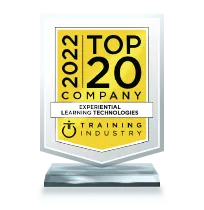Elevate your training with CenarioVR®—a no-code simulation and immersive learning tool.




better results in less time with the easiest VR authoring tool imaginable.
Immersive learning on desktop, mobile, or with a VR headset.

Desktop / Web Browser

Mobile / Tablet

Headset

Any Situation Imaginable
More effective learning for common situations. Explore courses below.
Construction Site Safety »
Stroke Scenario »
Parts Assembly »
Hotel Safety »
Theft Prevention »
Historic Dockyard »
Show More
Show Less
Healthcare
Sanitary Inspection
Onboarding
Manufacturing
Customer Service
Banking
Energy
Threat Recognition
Sales Training
Retail
Food Preparation
Interviewing Skills
Safety
Equipment Operation
Security

Mistakes made in VR are mistakes not made in reality.
Develop conditioned responses, problem-solving skills, and muscle memory—even before they’re on the job.

Sarah just spilled over $200,000 worth of fragile product from her forklift. It cost her company $0.

The easiest VR course creator imaginable.
Generate/Capture
Let AI create your scene or upload any 360º video/photograph.
Create
Add hotspots, animation, 3D objects, quizzes, and more.
Share
Publish to the web, mobile, authoring apps, LMS, & headsets.
Track
View live scores and a dashboard of xAPI analytics.
More functionality than any other immersive learning tool.

Interactive Objects & Actions

3D Objects You Can Almost Touch

Conditional Branching

Life-Like Immersive Audio

xAPI Tracking

Drag, Drop, & Spin Objects

Loved by the industry. Praised by clients.












Driving extraordinary outcomes for clients globally.
Publish, Share, & Access Anywhere
Host and track files directly in the CenarioVR app or easily publish and download SCORM, xAPI, cmi5, & HTML files. Share to the web, your LMS, authoring app, mobile device, or nearly any headset.
Content Viewing Options

Web & Mobile Access

Lectora® & Authoring Apps

Windows Standalone

Any SCORM or xAPI-Based LMS

Lenovo Mirage S3

HTC Vive Focus, Vive Focus 3, Vive, & Vive Pro

Don’t take our word for it…




Contact Us
801.796.2767
8 AM – 5 PM MST
Community
Meet with other L&D professionals, share your creations, learn tips and tricks, and so much more!
Knowledge Base
Visit the Knowledge Base for tutorials, help articles, and getting started guides on all our products.
































